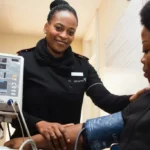Cervical cancer is a significant health concern globally, and for women in Nigeria, it represents a particularly daunting reality. Understanding this disease – its causes, risks, and crucially, how to prevent and detect it early – is vital. This type of cancer develops in the cervix, the lower part of the uterus connecting to the vagina. While serious, cervical cancer in Nigeria is often preventable and highly treatable when caught early through effective screening.
What is Cervical Cancer & Its Link to HPV?
Most cases of cervical cancer are caused by persistent infection with high-risk strains of the Human Papillomavirus (HPV), a very common sexually transmitted infection. Strains HPV-16 and HPV-18 are implicated in a large majority of cervical cancer Nigeria cases and globally.
Normally, the body’s immune system clears HPV infections. However, in some individuals, the virus persists for years, potentially causing changes in cervical cells that can eventually develop into cancer. This highlights the strong link between HPV and cervical cancer.
Cervical Cancer Facts & Statistics (Nigeria Focus)
Understanding the scope of cervical cancer in Nigeria underscores the need for awareness and action:
- Nigerian women are at risk of HPV exposure from age 15 onwards, upon becoming sexually active.
- Approximately 12,075 new cases of cervical cancer are diagnosed annually in Nigeria.
- It ranks as the second most common cancer among Nigerian women aged 15-44.
- An estimated 3.5% of Nigerian women may have an active cervical HPV-16/18 infection at any given time.
- About 66.9% of invasive cervical cancers in the region are linked to HPV types 16 or 18.
Risk Factors for Cervical Cancer in Nigeria
Besides persistent high-risk HPV infection, other factors can increase a woman’s risk of developing cervical cancer in Nigeria:
- Human Papillomavirus (HPV) infection: The primary cause.
- Smoking: Increases risk significantly.
- Weakened Immune System: Conditions like HIV/AIDS make it harder to clear HPV infections.
- Other Sexually Transmitted Infections (STIs): Having other STIs like chlamydia or gonorrhea can increase risk.
- Multiple Sexual Partners: Increases the likelihood of HPV exposure.
- Early Sexual Activity: Starting sexual activity at a younger age.
- Long-term Use of Hormonal Contraceptives: Some studies suggest a slightly increased risk with prolonged use (discuss with your doctor).
- Multiple Full-Term Pregnancies: Having many children is linked to a slightly higher risk.
- Exposure to DES (Diethylstilbestrol): A drug formerly used to prevent miscarriage.
Cervical Cancer Prevention Strategies
The good news is that cervical cancer prevention is possible! Key strategies include:
- HPV Vaccination: Discuss the HPV vaccine with your doctor. It protects against the high-risk HPV types most likely to cause cervical cancer and is most effective when given before sexual debut (recommended for girls aged 9-14, with catch-up options often available).
- Regular Screening: Participate in routine cervical cancer screening Nigeria programs (see details below). This is crucial for detecting pre-cancerous changes early.
- Practice Safe Sex: Consistent condom use reduces the risk of HPV and other STIs linked to cervical cancer. Limiting the number of sexual partners also lowers risk.
- Don’t Smoke: If you smoke, quitting significantly reduces your risk. If you don’t smoke, don’t start.
Recognizing Potential Cervical Cancer Symptoms
Early-stage cervical cancer and pre-cancerous changes often have NO symptoms, highlighting the importance of screening. When symptoms do occur, they might include:
- Abnormal vaginal bleeding (after sex, between periods, after menopause, heavier/longer periods).
- Unusual vaginal discharge (may be watery, bloody, or have a foul odor).
- Pain during intercourse.
- Pelvic pain.
- Later stage symptoms might include: Leg swelling, difficulty urinating or having bowel movements, blood in urine, unexplained fatigue, weight loss, and lower back pain.
Note: These symptoms can be caused by many conditions other than cancer. See a doctor if you experience any unusual changes.
How Cervical Cancer is Detected in Nigeria
Cervical cancer screening in Nigeria aims to find pre-cancerous cell changes on the cervix so they can be treated before cancer develops or to find cancer at an early, highly treatable stage. The main tests are:
- Pap Test (Pap Smear): A sample of cells is collected from the cervix during a pelvic exam and examined under a microscope for abnormalities. Recommended typically starting at age 21 or 25, repeated every few years.
- HPV Test: Tests the collected cervical cells specifically for the presence of high-risk HPV DNA strains known to cause cancer. Can be done alone or with a Pap test (co-testing). Increasingly becoming the primary screening method for women over 30.
The Screening Process: The procedure involves lying on an exam table while the doctor uses a speculum to view the cervix and collects a cell sample using a small brush or spatula. It’s usually quick, lasting only a few minutes.
Cervical Cancer Treatment Options
If cervical cancer is diagnosed, treatment depends on the stage and other factors. Options may include:
- Surgery: To remove pre-cancerous cells, cancerous tissue, or potentially the cervix and/or uterus.
- Radiation Therapy: Uses high-energy beams to kill cancer cells (internal, external, or both).
- Chemotherapy: Uses drugs to kill cancer cells, often combined with radiation for locally advanced cancer.
- Targeted Therapy & Immunotherapy: Newer treatments targeting specific cancer cell characteristics or boosting the immune system.
Conclusion
Cervical cancer in Nigeria poses a serious threat, but it is largely preventable through HPV vaccination and detectable early with regular screening. Understanding the risks, recognizing potential symptoms, and participating in recommended cervical cancer screening Nigeria programs (Pap tests and/or HPV tests) are essential steps every woman can take. Prevention is powerful, and early detection saves lives.
Don’t delay your screening. Healthtracka offers convenient options for essential women’s health tests, potentially including components relevant to cervical cancer screening (like HPV testing, depending on available packages). Take control of your health from home.
Visit www.healthtracka.com or contact us to learn more about relevant health screening options.
References:
Cancer.net, Cervical Cancer: Risk Factors, https://www.cancer.net/cancer-types/cervical-cancer/risk-factors




